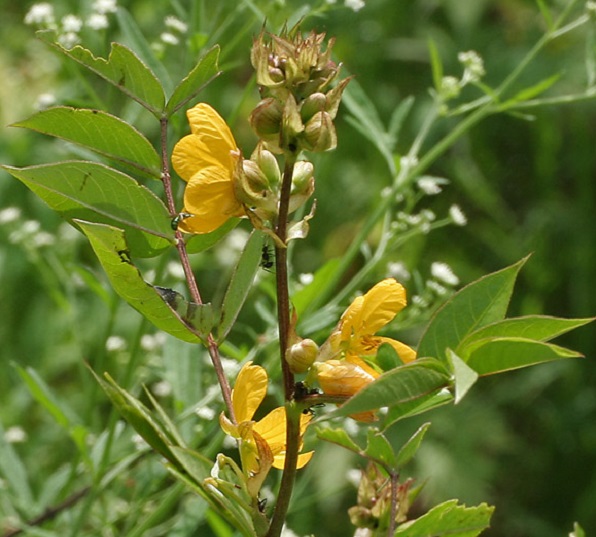Monsoons are a good time for botanical pursuits. That beauty of knowing the unknown was experienced by this writer — during my Monsoon field visits, while accompanying my late uncle, Venkatram Daithota, a folk practitioner, who was a botanist-herbalist by passion.
He would often quote the Sanskrit verse, Naasti moolam anoushadham — there is no herb which is non-medicinal and that the flaw is in non-identification and absence of research, or merely the absence of the right yojaka, or user.
One such useful medicinal plant that is little known to today’s generation is the Negro coffee plant, which goes by its botanical name, Cassia occidentalis — a potential nutraceutical.
Cassia occidentalis’ other names are kasamarda [killer of cough], in Sanskrit, kasoundi in Hindi, elevarike soppu or elemuri soppu in Kannada, kasavinda in Telugu, kasvida in Marathi, kesenda in Bengali, hant theng in Assamese, kasoundari in Gujarati, and peyaveri in Tamil.
This plant is well-known globally as Coffee Senna, Negro Coffee, Mogdad Coffee, Stephanie Coffee, Stinking Senna, or stinking weed, too. Most of such names relate to its usage in making a coffee-like beverage by roasting the seeds of the plant.
The plant is rich in enzymes, viz., achrosin, aloeemodin, emodin, anthraquinones, anthrones, apigenin, aurantiobtusin, campesterol, cassiollin, chryso-obtusin, chrysophanic acid, chrysarobin, chrysophanol and chrysoeriol, among others. The extracts are found to exhibit antibacterial, antifungal, antimalarial, anti-inflammatory, antioxidant, hepatoprotective and immunomodulant properties.
Ayurvedic texts praise this plant as a significant alleviator of pitta dosha with healing effects on different variants of cough. The leaves alleviate cough, poisons and bleeding conditions. They are also useful for tastelessness, indigestion, intestinal worms, throat disorders, excess phlegm and skin diseases.
- The leaf juice with honey is useful in cough. Caution has to be, all the same, exercised as it can sometimes induce emesis [vomiting] and purgation which may be necessary therapeutically; or, maybe, potentially toxic, depending on the dose. Your physician’s guidance is recommended when medicinal usage is of concern
- The leaf paste is applied externally for skin conditions, such as herpes, or urticaria
- The root decoction is useful in cases of oedema [swelling], including filariasis.
Food is an important usage in relation to Coffee Senna. Roasted leaves and seeds make potential components of the cuisine.
- Roasted seeds are brewed to prepare a coffee-like beverage
- Roasted leaves are used in preparations of chutney [coconut-based seasoned paste], and tambuli [a paste of roasted leaves in seasoned buttermilk]
- Fritters are also experimented with by adding the leaves to gram flour and deep frying in oil
- Spicy rice cakes are prepared with the leaves in a spicy rice batter and steamed.
The dosage and form of usage is an integral part in deciding on the medicinal, or culinary, usage of any herb. Any flawed usage of any plant can exhibit certain adverse, or mild-to-moderate toxic symptoms too. Hence, the guidance of a physician, or health advisor, is recommended when using any new plant as food, or medicine.

